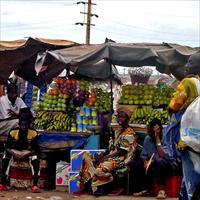NIGERIA: Urbanisation chokes commerce

Shop owners in Nigeria’s northern Kano state told IRIN a government plan to wipe out illegal businesses has thousands of small business owners floundering in a region where population density and unemployment are among the highest nationwide.
“I was not given any notice to vacate,” said Sani Abdullahi, who told IRIN he sold household goods out of a stall for the past eight years in Kano city, the state capital. “More than a dozen armed policemen accompanied by officials from KNUPDA [Kano Urban Planning and Development Authority] stormed my stall and pulled it down and all my wares. I have lost everything. I do not know where to start from.”
KNUPDA said that since 14 January it has demolished 3,000 of 10,000 illegal businesses in the city earmarked for destruction by the end of September. The agency initially targeted the most packed parts of Kano’s business district.
But shopkeepers who did not have the requested permits of operation said this was the first time they had heard of such a requirement in all their years of doing business.
“No one has ever needed a permit to set up a business,” said clothing store owner Adamu Habibu. He told IRIN he was given one day’s notice before his shop of six years was torn down - enough time to pack his merchandise. “But I do not know where to get the money to set up a new shop in the area where I have been relocated [Farm Centre neighbourhood 20km away].” He said the government has offered land, but nothing else.
Demographic dilemma
According to Nigeria’s National Population Commission, since 1991 Kano city’s population has grown by more than 60 percent to almost three million people concentrated on 230sqkm, or some 12,000 people per square kilometre.
KNUPDA’s managing director Hassan Sani Na-Abba told IRIN the growth has been commercially-driven. “We did not plan for this increase and lack adequate infrastructure to accommodate the people who have moved [here] in recent years.”
The pressure on the city has been “enormous”, said government demographer Nura Ibrahim Hassan. He told IRIN the only way the government can tackle congestion is to “spread economic activities and infrastructural development” to other parts of the state. “Anything short of that will not work,” he said.
Government officials have offered to relocate shop owners to Farm Centre and Sokoto Road, two nearby neighbourhoods with available plots. Relocation requires the approval of a district traditional chief from Kano state. This is to “take care of our own people first before we turn to outsiders,” said planning director Na-Abba.
House hold goods vendor Abdullahi is originally from Sokoto state. He told IRIN he has not heard from the government regarding relocation.
Crime
Government officials told IRIN that a number of the structures they destroyed had been criminal havens. “During the demolitions, we uncovered weapons and drugs,” said KNUPDA director Na-Abba. “A decapitated body [including] a human thigh were found [in] two…locations.”
Kano police spokesman Baba Mohammed told IRIN it is increasingly difficult to investigate crimes. “A lot of criminal activities are perpetrated in [these] illegal shops.” He said it is not possible for fewer than 10,000 policemen to cover almost three million people.
But criminality will only worsen with the demolitions, said economist Garba Ibrahim Shela with Kano’s Bayero University. “Kano has the highest unemployment rate in Nigeria. A number of these [shopkeepers]…were repentant criminals who are now unemployed. The danger is that they are very likely to return to crime now that they have nothing to live on.”
The economist said without a government lending programme to help the displaced business owners there will be an “upsurge in crime [including] theft, drugs and burglary.”
The planning authority’s Na-Abba told IRIN that officials recognised the risk of the demolitions but concluded it was “more important to clean up Kano than keep some small business owners employed.”
He said the government has no immediate plans to offer business loans.
Urban growth rates in Africa are the highest in the world with half of the continent’s population expected to be living in urban areas by the year 2050, according to the UN Human Settlements Programme (UN-HABITAT).
 Back and Next - Back and Next
Back and Next - Back and Next See Also - See Also
See Also - See Also